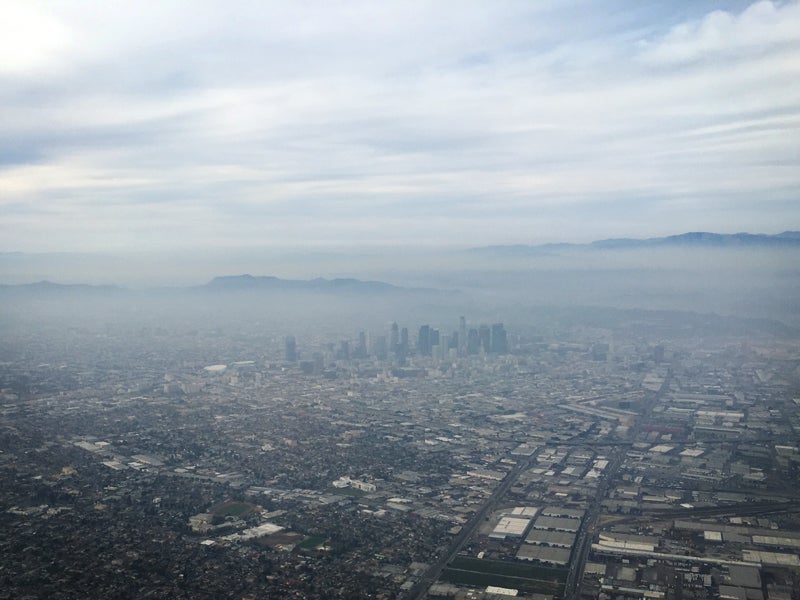Earthjustice Takes Air Board to Court for Failing to Curb Los Angeles Smog
Our lawsuit challenges an oil industry-backed plan to blunt smog clean up in the LA region.

This page was published 9 years ago. Find the latest on Earthjustice’s work.
People in the Los Angeles region suffered a huge blow when local regulators at the South Coast Air Quality Management District accepted an oil industry proposal back in December. Instead of adopting a more health-protective proposal to curb harmful smog, the air district’s appointed leaders approved a far weaker plan developed by the Western States Petroleum Association, the leading oil lobbying group in the Western U.S. The plan will amend an anti-pollution program called NOx RECLAIM in a way that benefits oil and gas interests. Now, we’re taking the air board to court for this indefensible move.
The air board’s governing board—amidst great industry protest—on Friday rejected a proposal to reconsider its decision. The leaders chose to stay the course and place oil industry profits over public health. To make matters worse, last week, the air board removed its executive officer, Barry Wallerstein, who had pushed back against industry in order to advocate for stronger pollution controls.
Usually, decisions made by the South Coast Air Quality Management District board don’t garner much attention, but the choice to accept the oil industry plan spurred an editorial in the Los Angeles Times called “Backsliding on Clean Air.” The times editorial board summed it up well when they wrote that while many California elected leaders were at the United Nations climate summit in Paris this past December, “Southern California officials decided to make it easier for oil refineries, power plants and other big industrial operations to keep spewing smoggy emissions.”
The plan put forth by the petroleum association amends a regional pollution trading program called NOx RECLAIM. “NOx” is short for nitrogen oxides, which are harmful pollutants that, when mixed with volatile organic compounds and baked in the sun, form smog. NOx are generated by burning fossil fuels, and they’re a major contributor to the blankets of smog that cover Los Angeles for more than a third of the year. Instead of adopting “command-and-control” rules to directly regulate the region’s largest stationary sources of pollution, such as refineries, power plants and factories, Los Angeles has used this pollution trading system. It’s kind of like a stock market where people make money selling and trading, but instead of stocks, bonds or commodities like grain and steel, they are trading the right to send pollution into the lungs of Southland residents.
The basic premise of the NOx RECLAIM program is to put a cap on NOx emissions that is supposed to fall over time. In an ideal world, as pollution credits become scarcer when the cap is reduced, the credit prices increase. In this theoretical world, it would be cheaper in some cases to install pollution control devices than to pay for pollution credits.
But this is not what’s currently happening in the real world. One of the main critiques of the program is that there are too many pollution credits on the market. Under a market-based program, unless the cap is tightly tethered to the technological reality of how many emissions there should be, demand for credits will be low and their cost will be too. Too many credits mean it will remain cheaper for large polluters to buy pollution credits than to install life-saving pollution controls.
This is precisely what’s happening. There are too many credits available, and certain industries like refineries are hoarding them. The new oil industry modifications will only make the problem worse.
State leaders are aware of the dangers of poorly designed market-based programs, and the state has strict requirements to protect Californians from this exact problem. The California legislature requires that market-based programs, including NOx RECLAIM, achieve emissions cuts equal to direct pollution reduction programs. But the NOx RECLAIM program fails to live up to this standard and everyone knows it. Last month, leaders in the California senate wrote a letter calling on the air district board to “pursue immediate actions to achieve the necessary emissions reductions to comply with state and federal law.”
Today, Earthjustice, on behalf of Communities for a Better Environment, the Center for Biological Diversity and the Sierra Club, along with the Natural Resources Defense Council, filed a lawsuit challenging the air district board’s approval of this unlawful plan. Despite the fact that there is readily available technology to clean up polluting facilities, the oil industry-backed plan will do nothing to change the status quo. It will make sure pollution credits stay cheap so industry can continue to evade pollution controls and Los Angeles will continue to have the worst smog levels in the nation.
The revised NOx RECLAIM program is an unlawful sale of Los Angeles air quality to the highest bidder. Fossil fuel interests have hijacked the decision-making process, and the outcome is as bad for Southland residents as you would expect when polluting industries write the regulations that govern them. With today’s filing, Earthjustice is holding the South Coast Air Quality Management District accountable and demanding that its regulations to protect public health be determined by science, not oil industry profits.
The California Regional Office fights for the rights of all to a healthy environment regardless of where in the state they live; we fight to protect the magnificent natural spaces and wildlife found in California; and we fight to transition California to a zero-emissions future where cars, trucks, buildings, and power plants run on clean energy, not fossil fuels.